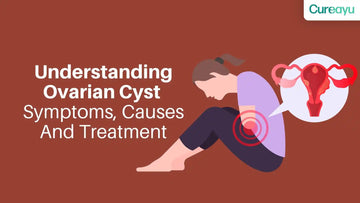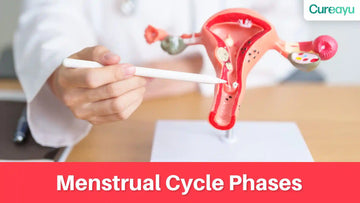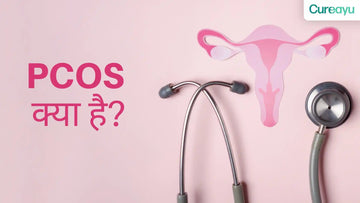Ovarian cysts are a common condition affecting many women during their reproductive years. While often benign and asymptomatic, they can sometimes cause significant discomfort and lead to complications if not properly managed. Understanding the symptoms, causes, and treatment options for ovarian cysts is crucial for maintaining reproductive health. This blog aims to provide a comprehensive overview of ovarian cyst symptoms and related information.
What Is an Ovarian Cyst?
An ovarian cyst is a fluid-filled sac that forms on or inside an ovary. Ovaries are the reproductive glands where eggs develop and are released during ovulation. These cysts can vary in size from small, pea-sized formations to larger masses that can cause noticeable symptoms. Most ovarian cysts are benign and resolve on their own without treatment. However, some cysts can cause pain and other complications, necessitating medical intervention.
Also Read: PCOD Problem in Women and its Impact on Female Fertility
Types Of Ovarian Cyst
- Functional Cysts: These are the most common type, including follicular cysts and corpus luteum cysts. They form during the menstrual cycle and usually disappear on their own.
- Dermoid Cysts: Also known as teratomas, these cysts can contain different types of tissues, such as hair, skin, or teeth, and are typically benign.
- Endometriomas: These cysts form due to endometriosis, where tissue similar to the lining inside the uterus grows outside it.
- Cystadenomas: These cysts develop from ovarian tissue and can become large, filled with a watery or mucous substance.
- Polycystic Ovary Syndrome (PCOS): This condition is characterized by the presence of multiple small cysts on the ovaries, often leading to hormonal imbalances and other symptoms.
Ovarian Cyst Symptoms
- Pelvic Pain: Persistent or intermittent pain in the lower abdomen can indicate the presence of an ovarian cyst. This pain might be sharp or dull and can worsen during certain activities.
- Bloating and Swelling: Ovarian cysts can cause abdominal bloating or swelling, making your abdomen feel heavy and uncomfortable.
- Irregular Menstrual Periods: Changes in your menstrual cycle, including heavy bleeding, spotting, or missed periods, can be a symptom of ovarian cysts.
- Pain During Intercourse: Experiencing pain during sexual intercourse is a common symptom associated with ovarian cysts.
- Frequent Urination: A large cyst can press against your bladder, causing an increased need to urinate or difficulty emptying your bladder.
- Lower Back Pain: Pain radiating to your lower back or thighs can be related to an ovarian cyst.
- Nausea and Vomiting: These symptoms, especially if accompanied by severe pelvic pain, could indicate a ruptured cyst or ovarian torsion, which requires immediate medical attention.
Also Read: Do You Know the Difference Between PCOD & PCOS
Ovarian Cyst Causes
- Hormonal Imbalances: Fluctuations in hormone levels can lead to the formation of functional cysts.
- Endometriosis: This condition causes the growth of endometrial tissue outside the uterus, leading to cyst formation on the ovaries.
- Pregnancy: Some cysts form during early pregnancy to support the embryo until the placenta develops.
- Severe Pelvic Infections: Infections that spread to the ovaries and fallopian tubes can result in cyst formation.
- Previous Ovarian Cysts: Having had cysts in the past increases the likelihood of developing them again.
How To Diagnose Cyst Problems
- Pelvic Examination: A doctor can detect swelling on your ovary during a routine pelvic exam.
- Ultrasound: This imaging test uses sound waves to create a picture of your ovaries and can help identify cysts and their characteristics.
- Blood Tests: Blood tests, such as CA-125, can be used to rule out ovarian cancer in postmenopausal women or if the cyst appears suspicious.
- Laparoscopy: A minimally invasive surgical procedure that allows the doctor to see your ovaries and remove cysts if necessary.
- CT Scan or MRI: These imaging tests provide detailed pictures of your internal organs and are used when ultrasound results are inconclusive.
Also Read: A Comprehensive Guide to Period Pain Relief
Is Ovarian Cyst Dangerous?
Most ovarian cysts are not dangerous and resolve on their own without treatment. However, complications can arise, such as cyst rupture, which can cause severe pain and internal bleeding. Ovarian torsion, where a cyst causes the ovary to twist, cutting off its blood supply, is another serious condition requiring immediate medical attention. Additionally, while rare, some cysts can be cancerous, especially in postmenopausal women.
What Size Of Ovarian Cyst Is Dangerous?
Cysts larger than 5 centimeters (2 inches) are more likely to cause symptoms and complications. Those exceeding 10 centimeters (4 inches) in diameter are considered significant and often require surgical evaluation. The risk of malignancy increases with the size of the cyst, especially in postmenopausal women.
Also Read: Unwinding the Mystery: Can Pregnancy Occur in PCOD?
Ovarian Cyst Treatment
- Watchful Waiting: Small, asymptomatic cysts often resolve on their own. Regular monitoring with ultrasounds can ensure they do not grow or cause problems.
- Medication: Hormonal contraceptives can prevent the formation of new cysts in women with recurrent cysts.
- Surgical Removal: Cysts that are large, persistent, or symptomatic may require surgical removal through laparoscopy or laparotomy.
- Pain Management: Over-the-counter pain relievers can help manage symptoms related to ovarian cysts.
- Lifestyle Changes: Maintaining a healthy diet and regular exercise can help manage symptoms and reduce the likelihood of cyst recurrence.
Conclusion
Understanding ovarian cyst symptoms and their implications is essential for women's health. While many cysts are benign and resolve independently, it's important to recognize the symptoms that may indicate complications. Regular medical check-ups, awareness of symptoms, and prompt treatment can help manage ovarian cysts effectively, ensuring better reproductive health and overall well-being. If you experience any concerning symptoms, consult with your healthcare provider for a proper diagnosis and treatment plan.












